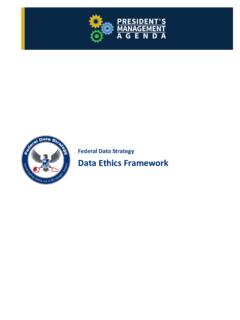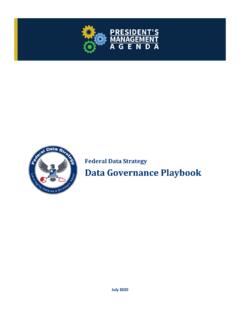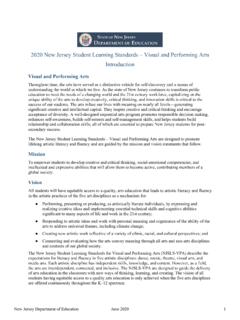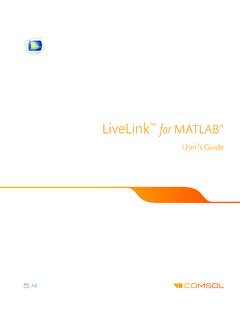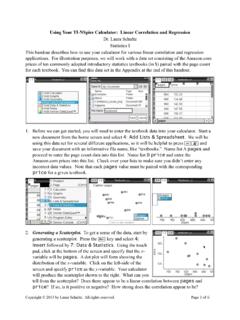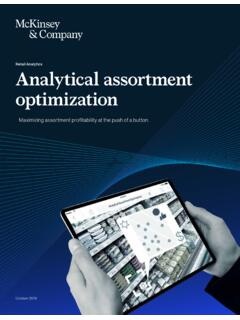Transcription of CDO PLAYBOOK
1 Advancing the Federal Data StrategyCDO PLAYBOOK2 INTRODUCTIONThe federal Chief Data Officer (CDO) position is a pivotal and transformational role that can significantly benefit the collection, organization, analysis and use of data in the agency as well as improve its value to society. The CDO must embrace the roles of change agent and evangelist to bring the inspirational vision of what data can do for all stakeholders. CDOs must seize opportunities to leverage data as a strategic asset within their organization, otherwise, the CDO faces the risk of becoming a compliance driven position. The CDO should first focus on finding opportunities to promote the sharing and access of data within their agencies. They must build critical relationships and show value in the near-term through quick wins, as data governance and master data management programs take longer to implement and demonstrate results.
2 It is a hard job with a value proposition not consistently appreciated and with challenges that are critical to overcome to properly serve their stakeholders and the American people. Federal agencies are at different points of their data journey. While some CDOs have data science teams that are leveraging advanced analytics to derive meaningful insights, others have little to no budget or staffing resources to carry out the initiatives that support their data vision and strategy. A 2020 Gartner survey shows 14% of CDOs have been in their roles for less than a Many come into their role finding data silos throughout their agency, with data in disparate places and data functions mostly decentralized. CDO reporting and organizational structures also vary f rom agency to agency.
3 Despite all this, CDOs must demonstrate early value generation, providing capabilities that build credibility and distinguish themselves as an executive far f rom the back office with a seat at the leadership Gartner. CDO Agenda 2021: Influence and Impact of Successful CDOs in the Sixth Annual CDO Survey. March 2021. 3 Federal CDOs come into their role needing a wide array of skills. They must be data evangelists responsible for changing the agency culture to use data to solve real problems and to adopt enterprise data standards that improve overall data quality as a by-product. They must inspire agency offices to engage in a shared unified vision for data by demonstrating they are strategic thinkers who understand how data can drive better agency outcomes and be of greater value to society.
4 Much like the Office of Personnel Management s (OPMs) five executive core qualifications (ECQs), it takes a variety of leadership skills, both hard and soft,2 to build trusting relationships with key stakeholders and advance the mission of their to federal CDOs, persons in this position must have the ability to: Communicate and translate complex concepts to all audiences Understand and prioritize organizational business challenges and deliver value in these areas Build and lead teams across the organization Remain goal oriented and focused on reaching specified objectives by establishing structure and managing towards outcomes Adapt and deal with different issues of importance to different customers Influence others to realize the mission value of data Manage change within organizationsThe goal of this PLAYBOOK is to help you be key value drivers as the federal government expands its use of data as a strategic asset.
5 2 See DOL s Soft Skills: The Competitive Edge for a list of example hard and soft skills )4 ABOUT THIS PLAYBOOKPLAY #1 Cultivate strong relationships to partner on solving mission problems with #2 Promote data sharing and break organizational #3 Build a data-driven culture by taking the lead to improve data literacy and acumen within your #4 Drive transformation through a mission focused data and analytics strategy that can influence the enterprise-wide business strategy and answer key agency CDO Council s Data Skills Working Group (WG) created this PLAYBOOK of four key plays which draws f rom successful practices in both industry and government. It is advice f rom CDOs to other CDOs, hence you will notice the informal tone and admonitions of what you should consider.
6 It leverages and cites concrete examples f rom federal CDOs on how they have applied specific strategies and approaches to make progress in each play to deliver value in this evolving role as a change management CDO PLAYBOOK is an iterative document that explores and defines the evolution of the federal CDO role. It provides new and existing CDOs with guiding principles, opportunities for quick wins, and best practices to navigate some of the key areas that CDOs should focus on today and over the next few years. THE PLAYSTo prepare this PLAYBOOK , a small working group of CDOs f rom both large and small agencies participated in discovery meetings to understand how they define their role based on each of their experiences.
7 Their successes, agency culture, pain points, and understanding of data management were assessed to recommend and agree on the four key plays. There is no one-size-fits all approach to the strategies a CDO will execute against these plays and no specific starting point. They are highly interrelated an`d are not prescribed in any order, instead quick wins to demonstrate value are possible f rom any point throughout all the plays. The information provided unearthed commonalities among people, process, technology, and data distinctions prevalent in many agencies. This PLAYBOOK is meant to be illustrative and insightful for recognizing value-based opportunities for any agency. Identify your key stakeholders and learn how best to engage them in problem solving through collaborative working relationships.
8 Engage IT decision makers to build partnerships around data Partner with stakeholders f rom across agency offices to collaborate on pilot projects that solve specific business CDOs should work with executive stakeholders to demonstrate how data and analytics initiatives address agency Continuously engage with decision-making executives and other key stakeholders to continue value proposition discussions and the value of data. Agency-wide representation and support gives a broader lens to the organizational drivers and constraints needed to make data-related Communicate to your entire workforce the progress, successes f rom your quick wins, and plans for building and delivering long-term capabilities for the partnerships to realize quick wins - CDOs are most successful when they engage and influence key stakeholders.
9 Your stakeholder engagement strategy should focus on forging relationships before zeroing in on data governance activities that may risk appearing solely compliance Identify your key stakeholders and learn how best to engage them in problem solving through collaborative working relationships. KEY ACTIVITIES Conduct a stakeholder analysis starting with leadership, then moving to agency or sub-agency offices. Key stakeholders should include a variety of levels of data expertise including agency data stewards with expertise in working with data as well as offices unaware of their data capabilities. Interview stakeholders to identify their mission needs and challenges. Give them opportunities to voice their interests and priorities.
10 Some example interview topics include priority questions, as well as data needs, acumen, access gaps, and opportunities, etc. Use stakeholder needs to guide decisions about how to remove any relevant organizational obstacles related to data goals and identify potential project PITFALLS Do not just start with data governance for the sake of data governance, partner on key questions to drive value. CDOs can improve data governance and data quality as needed to meet agency goals. PLAY #1 Cultivate strong relationships to partner on solving mission problems with STRATEGIC Engage IT decision makers to build partnerships around data ACTIVITIES Actively engage with key IT partners to collaborate on planned IT projects where data transformation opportunities exist or to gain access to IT environments and tools needed for future data projects.
